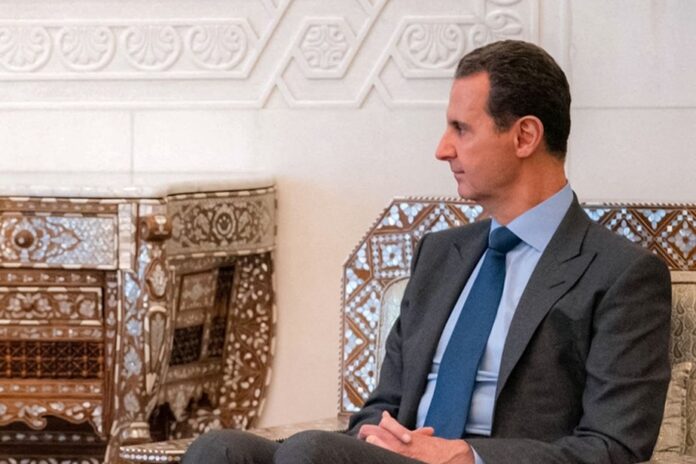Bashar al-Assad, who has been shunned by the international community for more than a decade because of his regime’s abuses to quell a major uprising, is on the way to getting back on his feet diplomatically.
• Syrian leader Bashar al-Assad, long declared persona non grata due to the violent crackdown on the popular protest movement in his country, recently restored diplomatic contacts with several Arab countries.
• Its return to grace would testify in particular to security considerations, several Arab leaders fearing that the country would fall back into a major conflict for lack of external support.
• The United States officially opposes any normalization of relations with the Syrian regime. However, they were weakly opposed to the steps of Arab countries in this direction.
Such, at least, is the stated will of many Arab regimes in the Middle East, which are increasing their overtures to the dictator without taking offense at his central role in a deadly conflict that has claimed hundreds of thousands of victims and millions of refugees and displaced persons. and which left large swaths of the country in ruins.
The rehabilitation movement, which began a few years ago, has greatly accelerated recently and could culminate in the formal reintegration of the country into the Arab League, although some divisions persist on this subject.
Saudi Arabia, which has long funded part of the opposition to the Syrian regime, displayed its new dispositions by sending its foreign minister, Faisal bin Farhan, to Damascus in April to meet the Syrian president.
Newspapers from both countries played prominently in photos of the meeting, which came a week after the senior Syrian diplomat made the trip to Riyadh.
The daily Al-Watan, in a text relayed by the International Courier, noted that the Saudi regime had informed the Syrian leader that it would do “everything possible” to allow his country “to regain its place in the Arab fold”. .
The Saudi initiative is far from unique, as evidenced by the fact that Bashar al-Assad himself was recently hosted by the United Arab Emirates along with his wife, who had not made an official trip for nearly two years. ‘a decade.
Exchanges also took place with the Sultanate of Oman, Egypt, Jordan and Tunisia, testifying to the importance of the current shift.
Iran, which has played a crucial link with Russia in keeping Bashar al-Assad in power, has added to the diplomatic ballet by dispatching President Ebrahim Raisi to Damascus this week. The last official meeting in high places of this nature between the two countries dates back to 2010, before the start of the Arab Spring.
Thomas Juneau, a Middle East scholar at the University of Ottawa, notes that Saudi Arabia may be hoping to limit Iranian influence by renewing formal ties with the Syrian regime.
The primary objective, he says, however, is to minimize the risk of potentially destabilizing conflicts in order to allow Crown Prince Mohammad bin Salman to move forward with a plan to “modernize” the country which requires foreign investment and an influx of tourists.
A recent study by the Arab Center Washington indicates that several Arab leaders fear that Syria will slide back into a full-scale civil war in the absence of significant external support. They would also like to curb the export of amphetamines to their country as part of an illicit traffic benefiting the Syrian regime.
The United States officially opposes the rapprochement efforts observed and refuses to consider lifting the sanctions imposed on the country in the absence of any process of political transition and accountability for the abuses committed by the Syrian regime.
A US State Department official, Barbara Leaf, however, said recently that countries reconnecting with Syria should make sure they get “something in return,” including respect for human rights.
Marie Lamensch, who is a project coordinator at Concordia University’s Montreal Institute for Genocide and Human Rights Studies, thinks the ongoing diplomatic overture is “discouraging” and has very little chance of lead to major concessions in this regard.
The countries concerned themselves have abysmal human rights records and have nothing to do, she says, with how the Syrian regime treats its people.
Bashar al-Assad himself seems very unlikely to make amends to Syrians anyway, most of whom live below the poverty line.
“If he had wanted to help them, he would have done so a long time ago,” said Ms. Lamensch, who bets on Western countries like Germany using universal jurisdiction over crimes against humanity to try to hold the regime to account.
Thomas Juneau notes that the American position regarding Saudi Arabia’s overtures reflects a certain pragmatism since Washington does not have “the means” to convince Riyadh to change course anyway.
With Tunisia’s authoritarian turn and Bashar al-Assad’s return to the saddle, there does not seem to be “much positive left from the Arab Spring” since most of the affected countries have returned to the status quo or worse, notes Mr. Juneau.
New uprisings are certainly to be expected, he notes, since the conditions that had fueled popular discontent persist in many places.
“The march to freedom is never easy. It’s long, it’s painful and there are always violent counter-revolutionary movements, “said the academic.


















